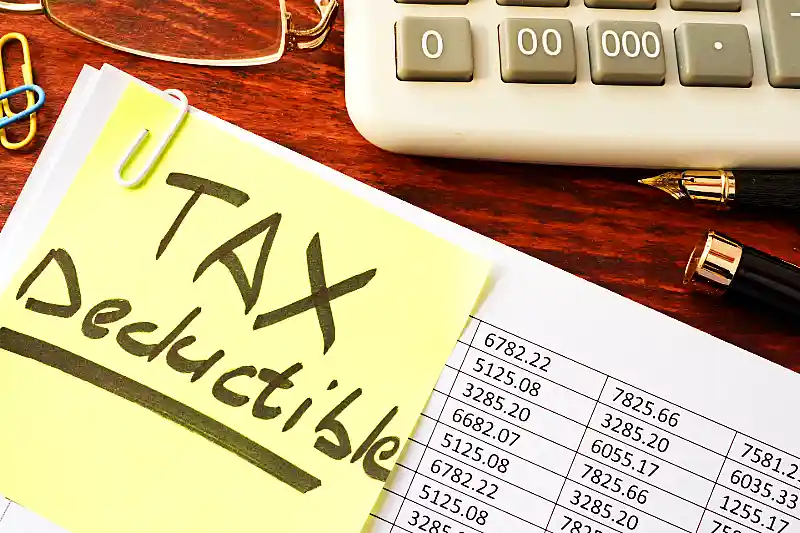Tax-Deductible Home Improvements Not to Miss in 2024
Hello, homeowners! Are you looking to add value to your home while saving on your taxes?
Tax-deductible home improvements enhance your living space, increase your home’s value, AND offer potential tax deductions, helping you save money.
We’ve got a list of ten tax-deductible home improvements that can help you do just that.
Read on for the top 10 tax-deductible home improvements for 2024!

Immediate Tax Deductions for 2024
Energy-Efficient Upgrades
Going green is not just good for the planet—it’s also great for your wallet! Installing solar panels or energy-efficient appliances can qualify you for a tax credit. Plus, you’ll save on energy bills!
In 2024, U.S. homeowners can get tax credits for energy-efficient improvements under the Inflation Reduction Act. These credits aim to encourage the use of energy-efficient products and renovations. They provide financial incentives to reduce both energy costs and environmental impact.
Claim up to $3,200 annually for qualified energy-efficient improvements and energy audits with the Energy Efficient Home Improvement Credit.
What Energy Efficient Products and Services Qualify?
-
- Doors – $250 per door, up to $500 total
- Exterior windows – $600 total
- Skylights – $600 total
- Air sealing materials and systems – up to $1,200
- Home energy audits – $150
- Heat pumps – $1200
- Biomass stoves – $1200
- Biomass boilers – $1200
- Central air conditioning – $300 for air conditioners recognized as ENERGY STAR Most Efficient.
- Air-source heat pumps – $300 for ENERGY STAR-certified heat pumps.
- Natural gas, propane, or oil furnace – $150 for ENERGY STAR-certified gas furnaces (except those certified for U.S. South only). Gas and oil furnaces with the ENERGY STAR label use fans meeting the $150 fan tax credit requirements.
- Advanced main air circulating fans – This fan must use no more than 2 percent of your furnace’s total energy to qualify for a $50 tax credit.
- Water heaters (non-solar) – $300 for ENERGY STAR-certified heat pump water heaters with an energy factor of 2.2+. The $300 credit can also be claimed for water heaters, including gas, oil, and propane units with an energy factor of 0.82 or more or a thermal efficiency of at least 90 percent.
Qualifications and Limits
-
- Maximum Credit: Yearly, claim a maximum of $1,200 credit for energy property and select home improvements. This includes limits on doors ($250 per door, up to $500 total), exterior windows and skylights ($600 total), insulation and air sealing materials and systems (up to $1,200), and home energy audits ($150).
- Additional Credit for Certain Items: An additional $2,000 per year is available for qualified heat pumps, biomass stoves, or biomass boilers.
- No Lifetime Limit: Unlike previous credits, there is no lifetime dollar limit. You can claim the maximum annual credit every year you make eligible improvements until 2032.
- Nonrefundable: The credit is nonrefundable. You can’t get back more on the credit than you owe in taxes. Any excess credit cannot be applied to future tax years.
Eligibility Criteria
-
- Home Location: The home must be located in the United States.
- Property Type: It should be an existing home that you improve or add onto, not a new home.
- Residence Requirement: In most cases, the home must be your primary residence.
What residential clean energy sources qualify?
In addition to the energy efficiency credits, homeowners can also benefit from the modified and extended Residential Clean Energy Credit. This provides up to a 30% income tax credit for clean energy equipment.
-
- Rooftop solar
- Wind energy
- Geothermal heat pumps, and
- Battery storage
Important Considerations
-
- Standards and Specifications: Home improvements must meet specific energy efficiency standards and be new systems and materials, not used ones.
- Documentation: You must keep receipts and records of all improvements and expenses. You will need them when claiming the tax credits.
Consult a tax professional or refer to IRS and ENERGY STAR guidelines for detailed compliance advice.
For more information, you can visit the IRS website on Energy Efficient Home Improvement Credit and the ENERGY STAR page on Federal Income Tax Credits and Incentives for Energy Efficiency
Home Office Enhancements
With remote work becoming the new normal, a well-equipped home office has become much more commonplace. For some, upgrades and maintenance to your home office are tax-deductible if you use it exclusively for business. You can only claim these deductions if the office is your main business place. So, if your home office doubles as a guest room, you might not be eligible for this deduction. Also, the amount you can deduct is limited to the net profit of your business.
Previously, employees working from home could deduct office expenses from taxes. The 2017 Tax Cuts and Jobs Act suspended miscellaneous itemized deductions. Thus, from 2018 to 2025, employees can’t claim the home office deduction on federal taxes. This applies even if their employer requires them to work remotely.
However, depending on your location, you might still deduct home office expenses on state taxes. Some states still allow these deductions, not conforming to federal law. Check your state’s tax laws to understand available deductions. Consult with a tax advisor for personalized advice regarding your tax situation.
Calculating your deduction
The IRS allows a simplified home office deduction of $5 per square foot up to 300 square feet. Alternatively, you can use the regular method to calculate actual home office expenses. These expenses include mortgage interest, insurance, utilities, and repairs, which are then apportioned based on the percentage of your home used for business. Consult a tax advisor to accurately determine your home office deduction.
Medical Modifications
If you, or a family member, requires certain home modifications for medical reasons—like installing ramps or widening doors—these can also be tax deductible.
Detailed Deductions for Medical Modifications
You, your spouse, or your dependents can qualify for IRS deductions if the primary purpose of home improvements is medical care. However, the deductible amount isn’t always the total improvement cost. It’s the improvement cost minus any increase in home value.
For example, if you install a lift for $10,000 and it increases the value of your house by $5,000, you can only deduct $5,000. You cannot deduct the remaining $5,000 that increased your home’s value.
Determining and Verifying the Increase in Home Value
Assessing home value increases from improvements can be complex. We recommend you seek assistance from a local real estate professional or an appraiser. They will provide an estimated market value before and after your home improvement. Be sure to keep all receipts and documentation related to your home improvements. These documents prove you did the work and establish costs if the IRS queries. We also recommend you take before and after photos for visual proof of your home’s transformation.
Qualifications and Limits
Medical home improvement deductions require expenses over 7.5% of your adjusted gross income. So, if your AGI is $50,000, you can only deduct the portion of your medical expenses that exceed 7.5% of $50,000 or $3,750. Consult a tax advisor for specific advice and to maximize deductions.
Roof Replacement
In 2024, roof replacements or repairs aren’t directly tax-deductible as personal expenses. However, there are specific circumstances when you can benefit from tax credits or deductions related to roofing work. Those include the following:
-
- Energy-Efficient Home Improvement Credit: If your new roof qualifies as an energy-efficient improvement, you may be eligible for a tax credit. The IRS provides credit for qualified energy-efficient home improvements made after January 1, 2023. You can claim a credit of up to $3,200.
- Home Office Deduction: If you use part of your home for business purposes as a home office, you might be able to deduct a portion of your roof replacement costs.
- Casualty Loss Deduction: If a natural disaster causes roof damage, the IRS allows homeowners to claim deductions for repairs related to events such as hurricanes, floods, or other natural disasters.
- Medical Necessity Deduction: For medical reasons, specific home modifications, including the roof, may qualify for a medical necessity deduction. This typically requires certification from a medical professional.
- Solar Panels and Related Roof Improvements: These costs may be deductible if you need to reinforce or replace your roof to install solar panels. Installing shingles that boost solar panel efficiency may also qualify for deductions.
- Renting Out a Portion of Your Home: If you rent part of your home, you can depreciate improvement expenses. This allows you to depreciate the cost depending on the percentage of rental use.
Tax laws are complex, so we recommend that you consult a tax professional for guidance. They can help determine your eligibility for these deductions and credits and ensure you maximize your tax benefits related to roofing work.
Home Security Systems
Are you contemplating investing in a state-of-the-art home security system? That’s another home improvement that can offer tax benefits.
Qualifying for a Tax Deduction
-
- Business Use of Home: If you have a home office that qualifies under IRS guidelines, you may be able to deduct the costs of a home security system. This applies if your home is your main business place and the space is used solely for business. Note: Previously, home-based employees could deduct office expenses from taxes. However, the Tax Cuts and Jobs Act of 2017 suspended miscellaneous itemized deductions. This includes the home office deduction for employees. So, from 2018 to 2025, employees can no longer claim this deduction on their federal income tax return. This applies even if their employer requires them to work remotely.
- Detached Buildings: If you have a separate structure like a garage or studio that is used exclusively and regularly for business, you can deduct expenses related to its security system.
- Rental Properties: If you rent a property and use it as your primary place of business, the security system for that property might be deductible.
Calculating the Deduction
- Partial Deduction: If the system covers your whole home and office, only part of the cost is deductible. This is calculated based on the percentage of your home used for business. For instance, if 25% of your home is used as a home office, you can deduct 25% of the security system’s cost.
- Direct vs. Indirect Costs: If the system exclusively covers the home office, it’s considered a direct cost, and the entire cost is deductible. If it covers the entire house, it’s an indirect cost, and only the portion covering the home office is deductible.
Other Considerations
- Professional Advice: Tax laws can be complex, and the specifics of your situation may vary. Consult a tax professional for advice and IRS compliance.
- Insurance Discounts: Regardless of tax deductions, many insurance providers offer discounts if you install a monitored security system. This can be an additional way to save money.
- Tax Filing Options: To claim a deduction for your home security system, use the regular tax filing option rather than the simplified option. This means you itemize individual expenses.
To sum it up, while most homeowners cannot deduct their home security systems from their taxes, those who use their homes for business purposes might qualify for a deduction. The deduction amount depends on the extent to which the security system serves the business area of your home.
Landscaping for Business Purposes
If you use part of your home for business purposes, landscaping costs can be partly tax-deductible. The IRS allows for the deduction of expenses that are directly related to your home office. This could include a percentage of landscaping costs, calculated based on the proportion of your home used for business purposes. For example, if you have 10 rooms in your house and your office is one of them, you could potentially deduct 10% of your landscaping costs. This applies if your total landscaping and lawn expenses amount to a significant sum, like $5000. In this case, the potential deduction may be $500.
However, it’s important to note that not all landscaping improvements are tax-deductible. The IRS specifies that items “inextricably associated with the land” and those that improve the land’s value must be depreciated over 15 years. These improvements might include driveway repairs, lawn care services, sprinkler systems, and fencing. Yet, certain elements like trees, sod, plants, grading, and shrubbery don’t qualify for depreciation. They are not seen as having a “useful life” and are typically not considered write-offs unless the total landscaping cost is less than $500.
Furthermore, the IRS requires that part of your home be used exclusively and regularly as your principal place of business. It could also be used to meet clients or customers in the normal course of your business. The space must be used exclusively for business and not for personal use. If this condition is met, a portion of various home-related expenses, potentially including a fraction of landscaping costs, can be deducted.
Use tax software or consult a professional for accurate reporting and maximizing deductions. The rules and regulations around tax deductions can be complex, and personal circumstances can significantly impact the eligibility for such deductions.
Tax laws change; consult a professional or accountant for situation-specific advice.
Tax Savings Upon the Sale of Your Property
Certain property enhancements qualify as “capital improvements.” Capital improvements to a home refer to significant projects or upgrades that increase the value of the home, extend its lifespan, or adapt it to new uses.
Examples of capital improvements include additions to the home, such as new bedrooms or bathrooms, major landscaping projects, and extensive renovations or replacements, such as a new roof, remodeled kitchen plumbing, and electrical upgrades.
When selling your home, these capital improvements can offer substantial tax benefits. Improvement costs add to your home’s tax basis, the amount subtracted from the sale price to calculate profit. A higher tax basis means a lower profit. A lower profit means you owe less in capital gains taxes. Therefore, by increasing your home’s tax basis through capital improvements, you can potentially save thousands of dollars when you sell your home.
Keep accurate records of all capital improvements and their costs, as the IRS may request this information when you sell your home.
At Property.com, we’re here to guide you through every step of your real estate journey. Understanding the tax-deductible home improvements in 2024 is just one of the many resources we provide to help you achieve your real estate goals.
Keep exploring our many helpful articles and resources, and stay informed on the latest news. Sign up here for news on what’s important to you. Your real estate dreams await! With Property.com as your partner, you have the power to make them yours.




